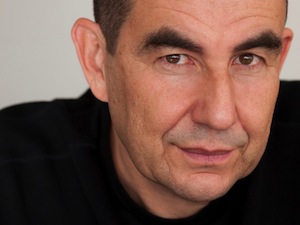Israel Defence Forces soldiers debrief during the Israel-Hamas conflict. New Israel Fund of Canada’s president Joan Garson discussed the painful war of this past summer and the ongoing responsibility of liberal Zionists in Canada to push for Israel to be a model of democracy, pluralism and tolerance. (photo from IDF via Ashernet)
The Jewish state won’t survive without a Zionism that’s liberal and a liberalism that’s Zionist. Such was the recurrent assertion of Haaretz reporter and columnist Ari Shavit at the New Israel Fund of Canada’s (NIFC’s) annual symposium, held on Sept. 14.
Entitled The Future of Israel Starts Here and held at the Toronto Centre for the Arts, the free event drew almost 1,000 people and marked the fourth annual symposium for NIFC, an organization founded 29 years ago that describes itself as being committed to fostering the development of Israel as a Jewish and democratic state “as envisioned in her Declaration of Independence.”
The symposium was moderated by Joseph Rosen, who recently wrote an article called “The Israel taboo” in an issue of the Canadian magazine The Walrus.
The event featured Rosen interviewing Shavit via Skype, as well facilitating a lively discussion between Shavit and Akiva Eldar, chief political columnist at the online magazine Al-Monitor, who attended in person. NIFC president Joan Garson also spoke.

Shavit spoke passionately about how the Zionist community needs to “talk seriously and honestly about our own mistakes” and to acknowledge where the government of Israel has committed wrongs both on a moral and political level, such as with ongoing settlement building in the West Bank. He argued this must be frozen to give the Palestinians space economically and geographically and “to move toward a two-state solution.”
It’s imperative that Zionists stop treating Israel as being above criticism, he stressed. Zionists must look its sins in the face, address the arguments made on the other side of the conflict and “limit injustice to Palestinians as much as possible.”
Further, Shavit spoke about restoring Israel to its former “state of wonder,” its promise to serve as a refuge for Jews – “a home for our homeless” – and to be as just as possible.
“What happened in 1948 [when thousands of Arabs ran from or were driven from their homes and villages during the country’s founding] was in the context of the brutal history of the 1940s,” he said. “But after that, after we secured our existence at a terrible human cost for us and for them [the Palestinians], to go into the other 22 percent of the land and to try to co-opt it [through occupation and settlement building] is a huge mistake.”
But Shavit also argued that it’s unacceptable to exclusively demonize Israel for its injustices, as its critics often do, or to use the history of its founding to delegitimize it.
“Some of the world’s best democracies were founded on the terrible treatment of indigenous people. Israel can’t be singled out,” he said. “But let us remember our democratic past and try to build a future for the Palestinians.”
Garson discussed the painful war of this past summer and the ongoing responsibility of liberal Zionists in Canada to push for Israel to be a model of democracy, pluralism and tolerance.
“As liberals, we are activists,” she said. “We think it’s our job not just to sit on the sidelines, but to engage … to make Israel the country of its founders dreams…. When we see [Israeli] policies in need of change, we speak and we act.”
She added: “We must be honest with ourselves, our children and our congregations … to bring intelligence and clear thinking to Israel as we do to other issues … and to commit to telling the truth about the country to ensure there will be another generation of lovers of Israel.”
Rosen subsequently posed questions to Eldar and Shavit about whether liberal Zionism is “dead” and about the position of Israeli left-wing “peaceniks.”
Eldar, who described himself as a “radical peacenik,” argued that liberal Zionism is crucial to the future of Israel, but that it can’t coexist with the Israeli occupation of Palestinian territories.
It’s not enough to decry the settlements, he said, “we have to do something about it and call on every government in the world to do something.”
Eldar explained that he, therefore, does not buy products made in the settlements.
“If, God forbid, one of your friends was about to commit suicide, you would do everything to stop it,” he said “This [settlement expansion] is a suicidal project.”
Shavit later spoke about how many Israelis feel that Israeli “peaceniks” don’t care about them, that they’re more concerned with the well-being of the Palestinians than that of their own countrymen.
“We Israelis who advocate for peace need to love all our people, to go out and canvas and tell them why their future is connected to peace,” he said.
Eldar said the central problem is that fear seems to have become more effective than hope in addressing the Israeli-Palestinian conflict.
“We on the left are trying to sell hope,” he said. “I’m upset that people are trying to sell fear. Why not look at the glass half full? Look, for example, at how Egypt has worked with us [in the latest ceasefire negotiation between Israel and Hamas] instead of injecting more fear and saying we don’t have partners for peace in the region?”
He said that Israel needs to withdraw from the settlements, but not unilaterally. “We need to do it by making peace.”
– For more national Jewish news, visit cjnews.com.

